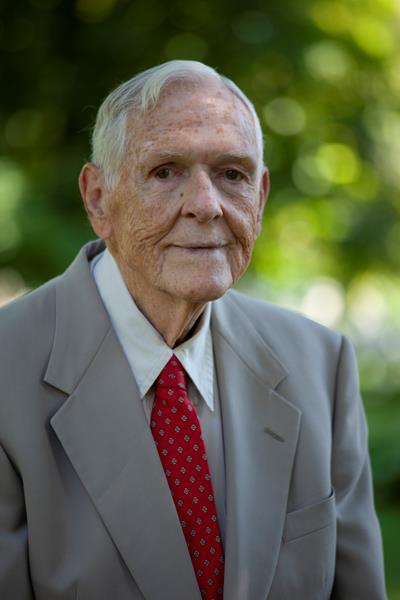 Emeritus Arts and Sciences Distinguished Professor Marcus T. McEllistrem died in June 2019. Marcus was born in 1926, in Saint Paul, Minnesota. Marcus and his wife, Eleanor, were married for 62 years and raised six children.
Emeritus Arts and Sciences Distinguished Professor Marcus T. McEllistrem died in June 2019. Marcus was born in 1926, in Saint Paul, Minnesota. Marcus and his wife, Eleanor, were married for 62 years and raised six children.
Following his service in the Naval Reserve in World War II, Marcus obtained his B.A. degree (1950) from St. Thomas College and M.S. (1951) and Ph.D. (1955) in nuclear physics from the University of Wisconsin. After a post-doc appointment at Indiana University, Marcus joined the UK faculty in 1957. He rapidly rose through the ranks to become a professor in 1965, and he remained in this position until his retirement in 1994; however, his research continued until just before his death.
Marcus had a leading role in proposing, designing and constructing the University of Kentucky Accelerator Laboratory (UKAL), and he served as director of the laboratory for its first 35 years.
Since UKAL’s inception in 1963, the research at the laboratory has been continuously funded by the National Science Foundation. Marcus encouraged many others to use the accelerator facility, and he gave freely of his time to assist others in their research efforts.
Marcus’ research was directed at understanding proton- and neutron-induced reaction dynamics in the few MeV range, and he became recognized as a world leader in neutron-induced reactions and their interpretation. Perhaps his greatest contributions were in applying his knowledge of neutron scattering to problems in nuclear structure physics. With many colleagues at the UKAL, he demonstrated how inelastic neutron scattering could be applied to problems in nuclear structure and how this reaction could be used to provide information which was unobtainable through other reactions.
The few MeV range of nuclear reactions is also of importance for applications, and throughout his career he applied his knowledge of nuclear physics to addressing societal issues. With medical colleagues, he examined the production and utility of short-lived radionuclides for medical applications such as radiotherapy and radiopharmaceuticals. He also examined nuclear methods for the detection of explosives and narcotics in luggage and cargo containers. He explored nuclear methods for the detection of land mines, and he performed pioneering studies of neutron activation analysis with fast neutrons. In addition, his research in nuclear astrophysics provided new insights into the determination of the age of the universe.
Marcus was a sought-after lecturer at national and international conferences and was a guest scientist at many prestigious institutions and laboratories, including Brookhaven National Laboratory, the University of Notre Dame and Bruyères le Châtel, CEA, France. In 1971, he was recognized as a Fellow of the American Physical Society, and in 1992, he was selected as the Distinguished Scientist of the Kentucky Academy of Science (KAS), later serving as president of the academy (1997).
Marcus was fully engaged in all features of academic life, and for his contributions he received many awards and honors. He was a UK Research Professor (1978-1979) and was elected by his peers as the Distinguished Professor of the College of Arts and Sciences (1981-1982) and as the chair of the University Senate (1991-1992). As a servant for the cause of science, Marcus was a program officer of the National Science Foundation (1981-1982), and he served as a member of the Kentucky NSF/EPSCoR Committee and as chair of the Kentucky Statewide Subcommittee for DOE/EPSCoR (1991-1982). In recognition of his many contributions to the University, he was named to the UK Arts and Sciences Hall of Fame in 1993.
Marcus’s legacy goes far beyond his contributions to pure and applied science, because he served as the mentor of many graduate students and postdoctoral scholars. While he enjoyed great personal success in his career, he took even greater satisfaction in the accomplishments of his students and colleagues. Those who worked with him will always remember his kindness and generosity. While the forms of recognition he received document a full life, his greatest impact was the many lives he enriched.
